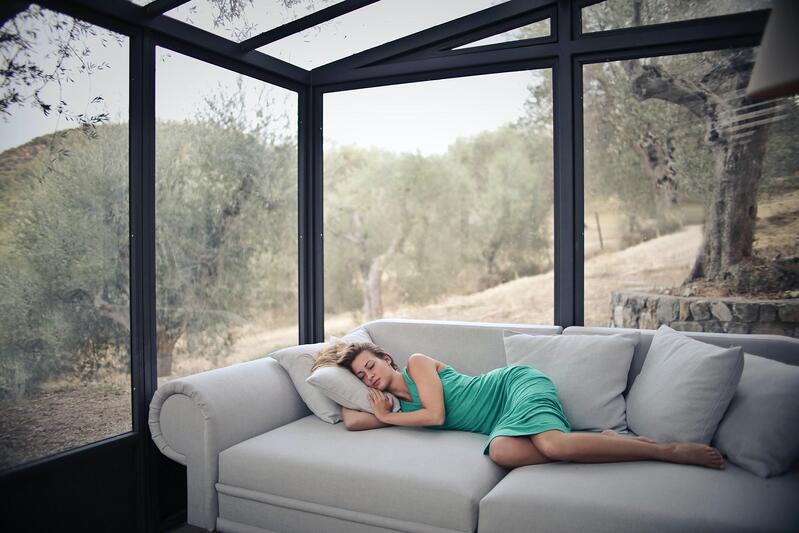Alaska Summer Sleep Tips:Sleeping Under the Midnight Sun
One of the things that makes Alaska such a unique place to live or visit is its amazing summers. Summer time in Alaska is like no other place in the U.S. because of the vast amount of daylight we get. In the northernmost parts of the state the sun refuses to set for nearly a month. In the interior, the sun briefly dips behind the mountains leaving golden hues to hold its place until it returns minutes later. And even in the southern parts of the state, periods of darkness are so short, that if you blink, you could miss it.
When you combine the copious amounts of daylight with a plethora of exciting outdoor activities, you come across a unique challenge: How do you sleep with all of this daylight?
While most resident Alaskans have grown accustomed to our unparalleled annual cycles of dark winters and radiant summers, many first-time visitors find the abundance of daylight to be a shock to their systems. So to help those of you visiting Alaska this summer here’s what you need to know about how daylight affects your sleep habits, and some tips to avoid sleep troubles.

How light affects sleep
Our patterns of sleep and wakefulness are regulated primarily by our circadian rhythms, also known as our “body clocks.” The functions of the circadian rhythm is based in the part of the brain known as the hypothalamus. Within the hypothalamus is a cluster of cells called the suprachiasmatic nucleus (SCN), which is connected to our optic nerves that sense changes in light.
The SCN is also responsible for regulating many body functions that revolve around the 24-hour cycle including: body temperature, heart rate, blood pressure, and the release of hormones such as melatonin which helps us with sleep.
When night begins to fall, the SCN senses the changes in lighting and begins to release melatonin to initiate and maintain sleep. In the morning when light begins to return, melatonin production decreases, and our heart rates, blood pressure, and body temperature increase, allowing us to wake up.
Too much light, especially at night, can aid in disrupting our circadian rhythms and making it difficult to initiate and maintain sleep. And when you’re visiting a place like Alaska during the summer, your body clock can easily get of out of sync, especially when you’re more than likely experiencing jet lag from traveling here on top of it, giving you two factors working against your circadian rhythm.
And if you end up losing too much sleep during your trip due to the daylight, not only will it make your stay in the north less enjoyable, it can also lead to sleep deprivation, and the development of a circadian rhythm sleep disorder.
Solutions for getting sleep during Alaskan Summers
But you shouldn’t worry too much about disruptions to your circadian rhythm. With a few sleep tips, you will more than be able to withstand the midnight sun, and even come to love and accept it like Alaska’s year-round residents do.
Here are a couple of tips to remember when visiting the Last Frontier:
- If you’re only visiting for a short time, try and keep your sleep/wake cycles as close to your home time zone as possible. By staying relatively close to your home time, you will avoid having to adjust to Alaska time, without having to adjust back to your home time after your short trip.
- If staying for longer than a weekend, start adjusting your sleep/wake schedule to match that of your destination. For instance, if you are traveling west to reach Alaska, start staying up a little later and waking a little later each day until you are in-sync with Alaska time. If traveling east to Alaska, go to bed and wake a little earlier until on AK Standard Time.
- Try to avoid the daylight in the evenings close to bedtime, and get exposure to light early in the morning. As stated before, light exposure helps regulate your sleep/wake cycles and getting or avoiding light at key times of the day can go a long way to keeping your sleep patterns healthy.
- Make sure that the bedroom you are staying in has dark curtains or blinds to keep the extra light out of the room. In a pinch, thumb-tacking a blanket over the window can work just as well.
- If sleeping in a bright room, RV, or in a tent under the midnight sun, wear a sleep mask to bed to keep the light from disturbing your sleep.
- Avoid alcohol close to bedtime. We know, you’re on vacation, so a nightcap is probably in order. However, while alcohol can make initiating sleep easier, it also causes you to have disturbed sleep and wake frequently in the night.
- And finally, just because you can stay up past midnight to enjoy all the wonders of Alaska, doesn’t necessarily mean you should. Unless of course you’re attending the annual Midnight Sun Baseball Game played by the Alaska Gold-panners, in which case staying up past midnight to watch a ball game played without artificial light is perfectly acceptable (and even encouraged).
So there you have it, a few summer sleep tips for your visit to Alaska this summer. We can’t wait to have you visit our beautiful state and share with you the wonders of the midnight sun.




